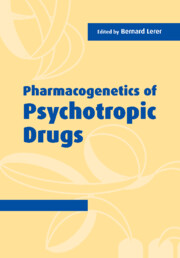Book contents
- Frontmatter
- Contents
- List of contributors
- Part I Introduction
- Part II Clinical background and research design
- Part III Molecular background
- Part IV Pharmacokinetics
- Part V Specific psychotropic drugs and disorders
- 10 Clozapine response and genetic variation in neurotransmitter receptor targets
- 11 Genetic factors underlying drug-induced tardive dyskinesia
- 12 Functional gene-linked polymorphic regions in pharmacogenetics
- 13 Alternative phenotypes and the pharmacogenetics of mood and anxiety disorders
- 14 Pharmacogenetics of anxiolytic drugs and the GABA–benzodiazepine receptor complex
- 15 Genetic factors and long-term prophylaxis in bipolar disorder
- 16 Genetic influences on responsiveness to anticonvulsant drugs
- 17 Apolipoprotein E as a marker in the treatment of Alzheimer's disease
- 18 Genetic variation and drug dependence risk factors
- Part VI Pharmacogenetics and brain imaging
- Part VII Industry perspectives
- Index
17 - Apolipoprotein E as a marker in the treatment of Alzheimer's disease
from Part V - Specific psychotropic drugs and disorders
Published online by Cambridge University Press: 20 August 2009
- Frontmatter
- Contents
- List of contributors
- Part I Introduction
- Part II Clinical background and research design
- Part III Molecular background
- Part IV Pharmacokinetics
- Part V Specific psychotropic drugs and disorders
- 10 Clozapine response and genetic variation in neurotransmitter receptor targets
- 11 Genetic factors underlying drug-induced tardive dyskinesia
- 12 Functional gene-linked polymorphic regions in pharmacogenetics
- 13 Alternative phenotypes and the pharmacogenetics of mood and anxiety disorders
- 14 Pharmacogenetics of anxiolytic drugs and the GABA–benzodiazepine receptor complex
- 15 Genetic factors and long-term prophylaxis in bipolar disorder
- 16 Genetic influences on responsiveness to anticonvulsant drugs
- 17 Apolipoprotein E as a marker in the treatment of Alzheimer's disease
- 18 Genetic variation and drug dependence risk factors
- Part VI Pharmacogenetics and brain imaging
- Part VII Industry perspectives
- Index
Summary
OVERVIEW
Recent evidence indicates that apolipoprotein E (ApoE) plays a central role in the brain's response to injury. The coordinated expression of ApoE and its receptors (the so-called low density lipoprotein (LDL) receptor family) appears to regulate the transport and internalization of cholesterol and phospholipids during the early phase of the re-innervation process in the adult brain. During dendritic remodeling and synaptogenesis, neurons progressively repress the synthesis of cholesterol in favor of cholesterol internalization through the apoE/LDL receptor pathway. The discovery, a few years ago, that a polymorphism in the gene for ApoE (the αpoE4 allele), found normally in 15% of the general population, is strongly linked to both sporadic and familial late-onset Alzheimer's disease (AD) raised the possibility that a dysfunction of the lipid transport system, associated with compensatory sprouting and synaptic remodeling, could be central to the AD process. The role of ApoE in the central nervous system (CNS) is particularly important in relation to cholinergic system, which relies to a certain extent on the integrity of phospholipid homeostasis in neurons. Recent evidence indicates that αpoE4 allele has a direct impact on cholinergic system activity in the brain as well as on drug efficacy profile in AD subjects treated with cholinomimetic agents. Furthermore, susceptibility factors such as the gene for butyrylcholinesterase, which acts in a synergistic manner to increase the risk of developing sporadic Alzheimer's disease, were shown to modify treatment outcome significantly in patients with mild-to-moderate AD treated with noncholinergic therapies.
Keywords
- Type
- Chapter
- Information
- Pharmacogenetics of Psychotropic Drugs , pp. 360 - 371Publisher: Cambridge University PressPrint publication year: 2002
- 2
- Cited by



